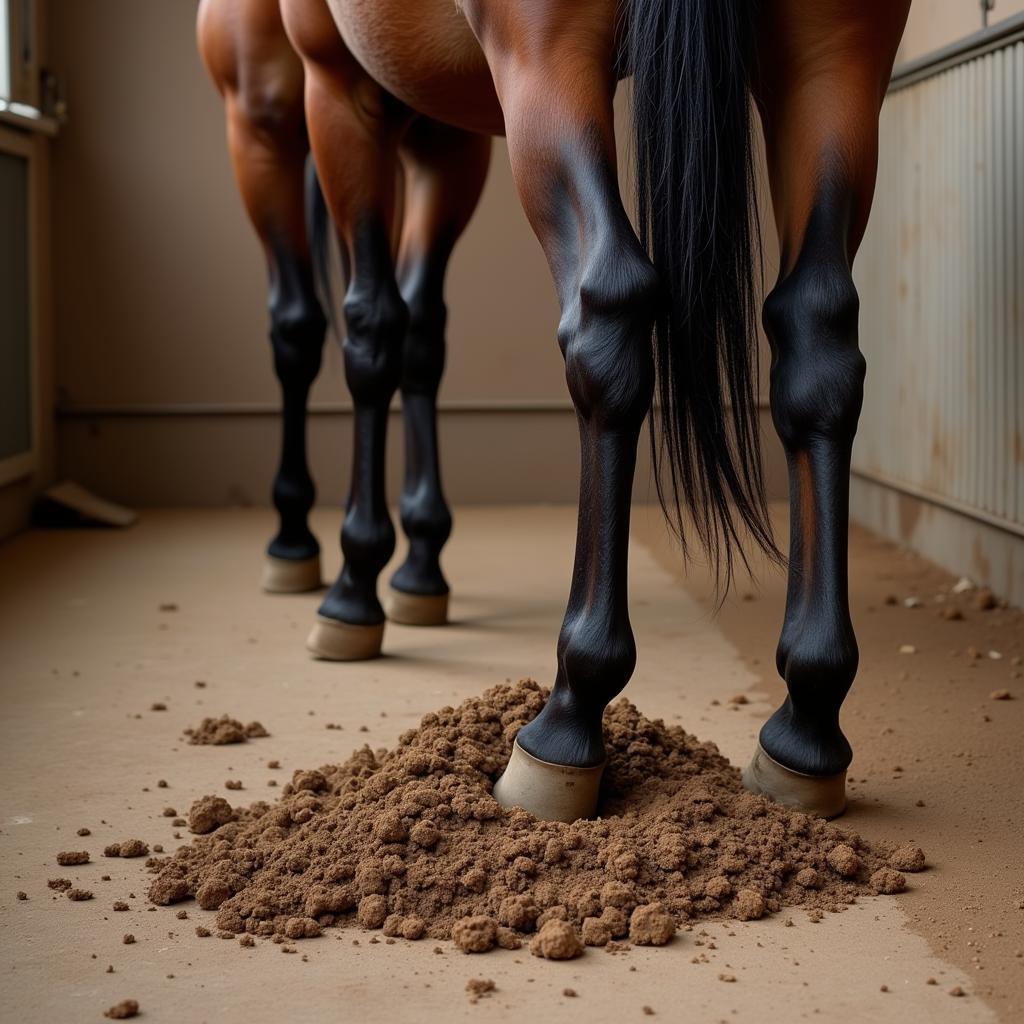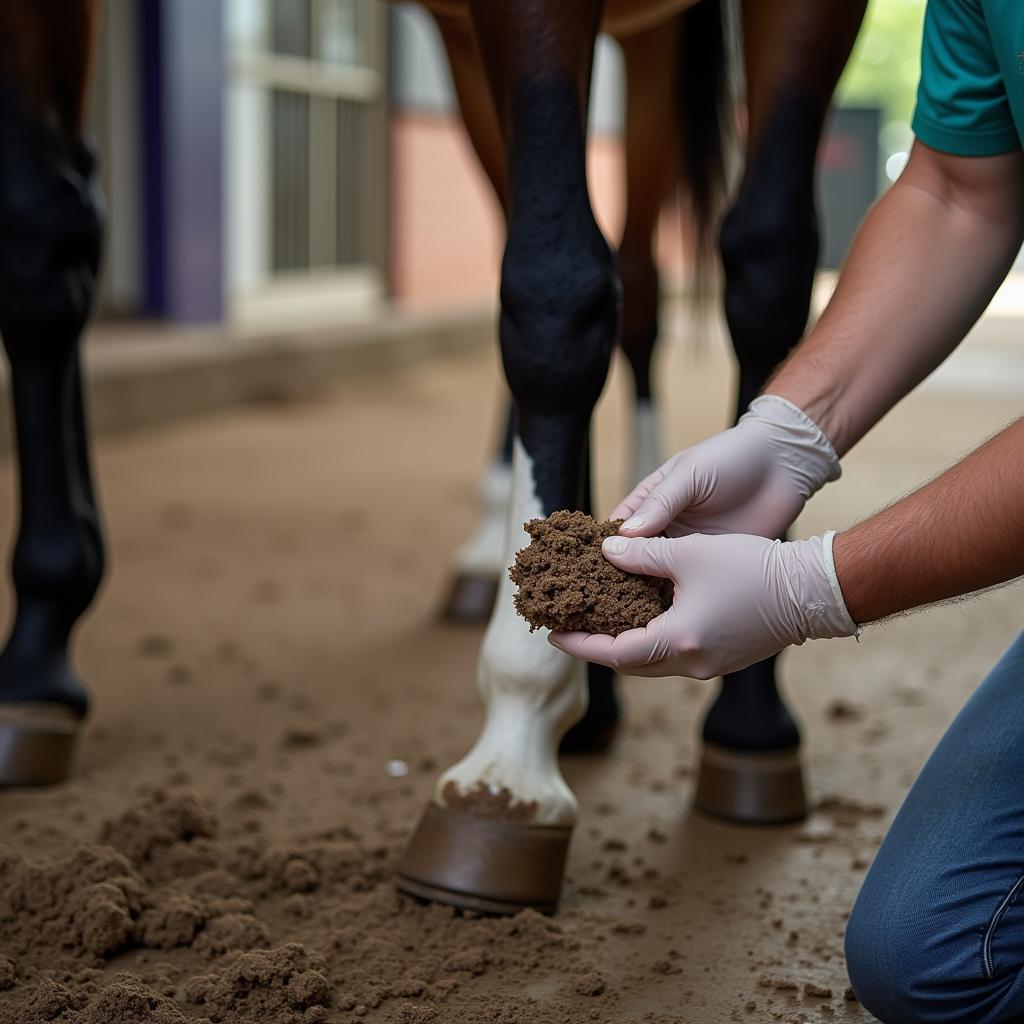Diarrhea in horses can be a distressing sight for any owner. It’s a common problem that can range from a mild inconvenience to a life-threatening condition. Understanding the causes and treatment for diarrhea in horses is essential for every horse owner to ensure their well-being. This article will guide you through everything you need to know about “Diarrhea Treatment For Horses”.
Recognizing the Signs of Diarrhea in Horses
Before initiating any diarrhea treatment for horses, it’s crucial to recognize the signs. Unlike humans, horses don’t always exhibit loose, watery stools. Instead, you might notice:
- Frequent defecation: Your horse might seem like it constantly needs to defecate, even if only small amounts are produced.
- Loose manure: While not always watery, the manure will lack its usual form and might appear cow-pie like.
- Straining: Your horse might visibly strain when attempting to defecate.
- Changes in color and smell: The manure might have an unusual color or a particularly foul smell.
- Lethargy and loss of appetite: These are general signs of illness in horses and often accompany diarrhea.
What Causes Diarrhea in Horses?
Understanding the cause of diarrhea is crucial for effective diarrhea treatment for horses. Here are some common culprits:
- Diet changes: Abrupt changes in feed, overgrazing rich pasture, or consuming moldy hay can upset a horse’s digestive system.
- Stress: Just like humans, horses experience stress. Transport, changes in routine, or competition can trigger diarrhea.
- Infections: Bacterial, viral, and parasitic infections are common culprits of diarrhea in horses.
- Medications: Some medications, like antibiotics, can disrupt the gut flora, leading to diarrhea.
- Underlying medical conditions: In some cases, diarrhea might be a symptom of a more serious underlying medical condition, such as inflammatory bowel disease or cancer.
 Horse Showing Signs of Diarrhea
Horse Showing Signs of Diarrhea
When to Call a Vet
While not every case of diarrhea requires immediate veterinary attention, there are times when prompt action is critical. Contact your vet immediately if you notice any of the following:
- Blood in the manure
- Severe lethargy or depression
- Fever
- Signs of dehydration
- Diarrhea persisting for more than 24 hours
- Diarrhea in a foal or a very old horse
Diarrhea Treatment for Horses: A Holistic Approach
Diarrhea treatment for horses often involves a multifaceted approach addressing both the symptoms and the underlying cause.
1. Identify and Eliminate the Cause
The first step in effective diarrhea treatment for horses is to identify and eliminate the underlying cause. This might involve:
- Reviewing your horse’s diet: Consider any recent changes in feed, grazing habits, or access to potential toxins.
- Reducing stress: If stress is a suspected trigger, try to minimize stressors in your horse’s environment.
- Testing for infections: Your vet can perform fecal tests to identify any underlying infections.
2. Supportive Care
While addressing the root cause, providing supportive care is essential to help your horse recover.
- Fluid therapy: Diarrhea can quickly lead to dehydration, which can be life-threatening for horses. Your vet might recommend intravenous or oral fluid therapy to rehydrate your horse.
- Electrolyte supplementation: Electrolytes are essential minerals lost through diarrhea. Your vet can recommend electrolyte pastes or powders to replenish these vital nutrients.
- Dietary adjustments: Your vet might recommend temporarily switching your horse to a bland diet, such as soaked hay and mashed potatoes, to ease digestion.
- Rest: Allowing your horse ample time to rest is crucial for recovery.
3. Medications
Depending on the underlying cause of the diarrhea, your vet might prescribe medications such as:
- Antibiotics: If a bacterial infection is present, antibiotics will be necessary.
- Anti-parasitics: For cases caused by parasites, your vet will prescribe the appropriate deworming medication.
- Anti-inflammatories: These can help reduce inflammation in the gut and alleviate discomfort.
 Veterinarian Examining a Horse for Diarrhea
Veterinarian Examining a Horse for Diarrhea
Preventing Diarrhea in Horses
Prevention is always better than cure. Here are some measures to help prevent diarrhea in your horse:
- Introduce new feeds gradually: Always introduce new feeds slowly over several days to allow your horse’s digestive system to adjust.
- Provide fresh, clean water: Ensure your horse has access to clean, fresh water at all times.
- Practice good pasture management: Rotate pastures regularly, avoid overgrazing, and remove any poisonous plants.
- Minimize stress: Establish a consistent routine for your horse and minimize potential stressors.
- Vaccinate and deworm regularly: Follow your veterinarian’s recommended vaccination and deworming schedule.
Diarrhea Treatment for Horses: A Collaborative Effort
Treating diarrhea in horses requires a collaborative effort between horse owners and veterinarians. By understanding the causes, recognizing the signs, and implementing appropriate treatment and prevention strategies, you can play a vital role in ensuring your horse’s digestive health and overall well-being.
Remember: This article provides general information and should not replace professional veterinary advice. If your horse exhibits diarrhea, consult your veterinarian for proper diagnosis and treatment.
FAQs about Diarrhea in Horses
1. Can I treat my horse’s diarrhea at home?
While some mild cases might respond to home remedies, it’s essential to consult your vet for an accurate diagnosis and treatment plan.
2. How long does it take for a horse to recover from diarrhea?
Recovery time varies depending on the cause and severity of the diarrhea. With prompt and appropriate treatment, most horses recover within a few days.
3. Can stress really cause diarrhea in horses?
Yes, stress can disrupt a horse’s gut flora and lead to diarrhea, just like in humans.
4. What are the signs of dehydration in a horse?
Signs of dehydration include sunken eyes, dry gums, loss of skin elasticity, and decreased urine output.
5. How can I prevent diarrhea in my horse?
Maintaining a consistent feeding schedule, providing fresh water, practicing good hygiene, and reducing stress can help prevent diarrhea in horses.
Need More Help?
If you’re dealing with a horse experiencing diarrhea, don’t hesitate to reach out. For expert advice and support, contact us at:
- Phone Number: 0772127271
- Email: [email protected]
- Address: QGM2+WX2, Vị Trung, Vị Thuỷ, Hậu Giang, Việt Nam
Our dedicated team is available 24/7 to assist you with all your horse care needs. We also offer a wide range of high-quality horse tack, including brown horse bridle, rope reins for horses, and horse driving harness parts.
We understand that a healthy horse is a happy horse, and we’re here to support you every step of the way.